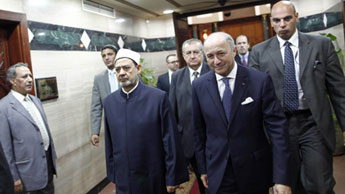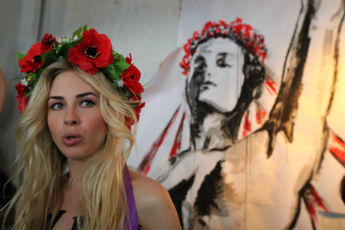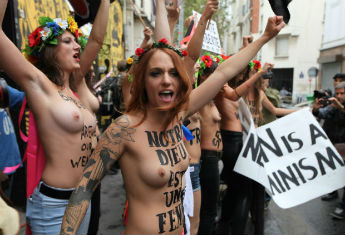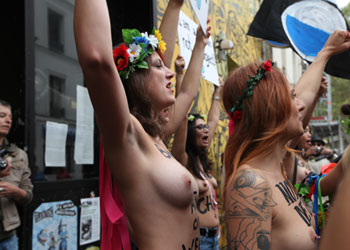www.aljazeerah.info
News, September 2012
Archives
Mission & Name
Conflict Terminology
Editorials
Gaza Holocaust
Gulf War
Isdood
Islam
News
News Photos
Opinion Editorials
US Foreign Policy (Dr. El-Najjar's Articles)
www.aljazeerah.info
|
Editorial Note: The following news reports are summaries from original sources. They may also include corrections of Arabic names and political terminology. Comments are in parentheses. |
The New Anti-Islam Media Campaign has a Sexual Theme:
How Should Muslims React?
By Hassan El-Najjar
Al-Jazeerah, CCUN, September 24, 2012
Orchestrated Anti-Islam Media Campaign Reaches France: Charlie Hebdo Cartoons and Topless Women in Paris Muslim Neighborhood
There's nothing coincidental about the anti-Islam provocations in the US-EU, from the continuous anti-Islam statements by American Republican politicians, to the sorry Coptic video, to the Charlie Hebdo cartoons, and to the topless women demonstrating in a Paris Muslim neighborhood.
They are all part of an orchestrated campaign that started with the Bush war in the Muslim world. The objective is to keep Americans and Europeans distracted from what their governments have been doing.
These media stunts aim at provoking Muslim reactions, particularly violent ones, in order to reinforce the image of Muslims as hostiles to Americans and Europeans.
The ultimate objective is preparing Americans and Europeans to accept more devastating wars against Muslims and justifying the horrendous wars against Muslims in the past decade, which resulted in killing hundreds of thousands of people and displacing millions of people in Iraq alone, let alone in other Muslim countries.
The hypocritical French government jails anyone who expresses his/her opinion about the Holocaust in any way different from the Zionist version of telling history. They, and other European governments, stand strongly against freedom of speech and freedom of expression when it comes to issues related to Zionism and Israel.
However, they say that they are in support of freedom of expression, when it comes to anti-Islam media stunts, such as the videos, cartoons, or provokative topless displays in Muslim neighborhoods.
The French 24 TV Arabic website published a news story (below), which was not published in the English version of the website. This means that it is intentionally published to target Arabic readers, in an apparent attempt to provoke a reaction from Muslims.
Ten French topless women, following a Ukrainian Women's style of nude protests, including recruited some Arab women from North Africa, came to the Paris Muslim neighborhood of Laghot Dor (the spelling may not be accurate, as it is translated from Arabic).
They displayed their naked body tops, showing some slogans written on their breasts and bellies, calling for sexual freedom and freedom of women to be nude.
The most important piece of information about this stunt is that these women were brought to perform this provokative display in a Muslim neighborhood in Paris, in a place where Muslims used to perform their Friday prayer, and on the day the French magazine published its anti-Islam cartoons !!!
Is this a coincidence?
I don't think so.
Is it the last of the anti-Islam stunts?
Absolutely not.
Then, what's the right reaction to these Satanic provocations of Muslims?
Is it by angry protests and acts of violence against innocent people or embassies?
Thant's against Shari'a and against the core of Islamic teachings.
Muslims should think calmly about the ultimate objectives of these Satan agents who are the orchestrators of all these anti-Islam stunts.
Muslims should demand US-EU governments to criminalize such anti-Islam stunts, just like most European countries criminalize any denial or skepticism of the Zionist version of the Holocaust story.
That should be the first step, then taking any perpetrators to court after that would be a deterrent to these criminals.
Any country which refuses to criminalize anti-Islam stunts would then risk campaigns of boycotting its products by 1.7 billion Muslims on this planet. Period.
======================================
France tightens embassy security over cartoons
A day after a French satirical weekly published incendiary cartoons of the Prophet Mohammed, security was tightened at French missions across the Muslim world amid growing calls for an international law against religious defamation.
By Leela JACINTO (text)
France 24, September 20, 2012
 |
|
| French foreign minister meeting with Al-Azhar Imam in advance of the publication of anti-Islam cartoons |
Security was tightened at French embassies, consulates, cultural centers and international French schools in countries with sizeable Muslim populations Thursday - a day after a Paris-based satirical weekly published obscene cartoons of the Prophet Mohammed.
Hours after the satirical weekly, Charlie Hebdo, hit the French newsstands Wednesday, the French Foreign Ministry announced that embassies and official missions in 20 Muslim countries would be closed on Friday.
FRANCE France to close embassies in fear of cartoon backlash
But in some countries - such as Tunisia and Egypt - the closures came into force earlier, with embassies, consulates, cultural centers and French international schools announcing they would remain shut until Monday.
The heightened security measures come at a volatile time across the Muslim world. Around 30 people have died over the past week in violent protests against an anti-Islam video clip produced in the US and posted on YouTube. The victims included US Ambassador to Libya Chris Stevens, who died of smoke inhalation following an attack on the US consulate in Benghazi.
The publication of the latest cartoons in Charlie Hebdo has been condemned by the French government.
In an interview with FRANCE 24 earlier this week, French Foreign Minister Laurent Fabius said that while he respects freedom of expression, he sees “no point in such a provocation.” Stressing that the French government would never encourage the cartoons’ publication, he called for “reason to prevail.”
But the magazine’s editorial staff has defended the decision to publish the incendiary cartoons.
Speaking to FRANCE 24 Wednesday, Charlie Hebdo editor Stephane Charbonnier – who uses the byline “Charb” – maintained that the publication was “not responsible for closing schools or embassies, or violence elsewhere in the world”.
Charb maintained that the views in the cartoons “were expressed under French law. I publish a paper sold in France. To us, the only limit is French law,” he said before adding, “the only thing that threatens the press is self-censorship. "
Growing calls for international blasphemy law
The latest provocation has increased the calls in some Muslim-majority countries for an international law that would criminalise the defamation of religion.
At a massive rally in the southern suburbs of Beirut earlier this week, Hezbollah chief Hassan Nasrallah called on "all our people and governments” to “put pressure on the international community to issue international and national laws to criminalise insults of the three world religions” - referring to Christianity, Islam and Judaism.
In media interviews given shortly after protesters attacked the US Embassy in Tunis last week, Rachid Ghannouchi, leader of the Tunisian Islamist Ennadha movement, also revisited the international blasphemy law theme.
“We need the UN to adopt a law criminalizing the violation of the sacred,” Ghannouchi told a local radio station.
French Foreign Minister Laurent Fabius meets Sheik Ahmed el-Tayeb, the grand imam of the Al Azhar mosque, in Cairo, Egypt. (Photo: AFP)
Another powerful voice in this debate has been the grand imam of Egypt’s influential Al Azhar mosque, Sheik Ahmed el-Tayeb.
Shortly before meeting with the visiting French foreign minister in Cairo earlier this week, Tayeb said he would ask Fabius to support such a measure at the UN.
But while condemning the incendiary YouTube video as “stupid and insulting,” Fabius noted the reluctance of France -- like most Western countries that have defended freedom of expression -- to criminalize the defamation of religions. "We must avoid any provocations. But preventative action is tricky because in a secular state, there’s the law and there’s faith. It’s the individual, not religion, who must be protected by the law,” Fabius told reporters in Cairo.
Save the believers, not the beliefs Within international legal and policy circles that have grappled with this issue -- and at times fought a bitter fight -- the growing calls for an international blasphemy law have been noted with disquiet.
LIBYA Mystery surrounds attack on Benghazi’s US consulate EGYPT Egyptian Copts fearful amid anti-Islam film backlash LIBYA - USA Romney's attack on Obama over Libya crisis backfires
“This issue has been around for a while,” explained Clive Baldwin, senior legal advisor at the New York-based Human Rights Watch. “There was a long discussion about this at the UN for more than a decade, when some states were trying to push for the defamation of religion to be included as a human rights issue. In the end, all the states agreed to drop the idea.”
At the heart of the matter was a campaign by the 57-nation Organisation of Islamic Cooperation (OIC) to include the thorny religious defamation issue in a UN Human Rights Council resolution.
The Saudi Arabia-based organisation argued that criticising religions is a violation of the rights of believers and leads to discrimination and violence against them.
Critics, however, maintained that an international blasphemy law could be used in certain countries to silence and intimidate religious minorities, dissenters and human rights activists. It would also restrict freedom of religion and expression, they argued.
After 12 years of diplomatic wrangling, the OIC finally dropped their campaign when a compromise deal was hammered out by the Obama administration last year, resulting in UN Human Rights Council Resolution 16/18, which switches the focus from protecting beliefs to protecting believers.
The effects of the Arab Spring According to Arch Puddington, vice president of research at Freedom House, a New York-based watchdog group, the rise of Islamist groups following the 2011 Arab uprisings has also fuelled the campaign for an international blasphemy law.
“I think this debate might be reignited and it’s an unfortunate development,” said Puddington. “The idea of having a global international blasphemy law is a terrible idea. I think it’s important for countries such as the US and France to stand firm behind the freedom of expression.”
Puddington warns that a basic problem with such a law is the definition of what constitutes religious defamation.
“We have to bear in mind that in some cases, those who propose the laws have a rather sweeping interpretation of what constitutes blasphemy,” he noted.
One of the earliest state promoters of an international “combating defamation of religions” law has been Pakistan, an OIC member state that has been repeatedly criticised for its notorious blasphemy laws, which unfairly target minorities as well as critics of the law – including leading politicians – with deadly consequences.
“The important point to bear in mind is that these laws of defamation are used by the powerful against the powerless,” said Human Rights Watch’s Baldwin.
When contacted by FRANCE 24, OIC officials, however, maintained that it was too early to say if the organisation would formally seek any legal changes to international frameworks following the recent disturbances.
“The first step would be to examine the existing legal structures to see if there are problems, and then may be there would be reason to re-examine them,” said OIC spokesman Rizwan Sheikh.
But he conceded that top OIC officials were holding “high level meetings” over “this unfortunate incident”, said Sheikh, referring to the YouTube posting of “Innocence of Muslims”.
==============================French paper risks Muslim anger with prophet cartoons
France 24, September
French satirical weekly Charlie Hebdo has announced that its Wednesday edition will contain cartoons of the Prophet Mohammed that the paper's editor said will "shock those who will want to be shocked".
Fears that a wave of anger in the Islamic world could spread to Europe mounted Tuesday as it emerged a French magazine was planning to publish cartoons caricaturing the Prophet Mohammed.
Satirical weekly Charlie Hebdo confirmed that its latest edition contains several cartoons featuring Mohammed that the publication's editor said would "shock those who will want to be shocked."
The magazine is due to hit the streets on Wednesday against a background of protests across the Islamic world over a crude US-made film that mocks Mohammed and portrays Muslims as gratuitously violent.
At least 30 people have died so far in demonstrations held in over 20 countries.
Charlie Hebdo is no stranger to controversy over its handling of the issues relating to Islam.
Last year it published an edition "guest-edited" by the Prophet Mohammed that it called Sharia Hebdo. The magazine's offices in Paris were subsequently fire-bombed in what was widely seen as a reaction by Islamists.
Charlie Hebdo's latest move was greeted with immediate calls from political and religious leaders for the media to act responsibly and avoid inflaming the current situation.
Prime Minister Jean-Marc Ayrault issued a statement expressing his "disapproval of all excesses."
The magazine's editor, originally a cartoonist who uses the name Charb, denied he was being deliberately provocative at a delicate time.
"The freedom of the press, is that a provocation?" he said. "I'm not asking strict Muslims to read Charlie Hebdo, just like I wouldn't go to a mosque to listen to speeches that go against everything I believe."
Dalil Boubakeur, the senior cleric at Paris's biggest mosque, appealed for France's Muslims to remain calm.
"It is with astonishment, sadness and concern that I have learned that this publication is risking increasing the current outrage across the Muslim world," he said.
"I would appeal to them not to pour oil on the fire."
Even before news of Charlie Hebdo's plans emerged, France's large Muslim community was being urged to take to the streets in defiance of an official ban on demonstrations over the controversial film.
Messages on Twitter and social networking sites called for demonstrations to be held Saturday in Paris, Marseille and other major cities, a week after police in the capital arrested 150 people for taking part in a rowdy protest near the US embassy.
Most messages read "Don't touch my Prophet", a variation of the French anti-racism slogan "Don't Touch my Mate" popular in the 1980s.
Interior Minister Manuel Valls said Sunday the authorities would not permit any more demonstrations against the film, saying Saturday's protest had been orchestrated by groups that "advocate radical Islam".
France is home to Western Europe's largest Islamic community, with at least four million Muslims in the country.
====================================
Ten Topless Women Demonstrate in Paris Muslim Neighborhood to Provoke Muslim Reaction
France 24, September 19, 2012
French 24 TV Arabic website published this news story, which wan not published in the English version. This means it was targeting Arabic readers, in an apparent attempt to provoke Muslims.
The ten topless women claimed to be Ukrainian (in Paris !) but they also included French and Arab women from North Africa.
The topless women had some slogans written on their breasts and bellies, calling for freedom of women to be nude.
The most important piece of information is that these women were brought to do this in a Muslim neighborhood in Paris, in a place where Muslims used to perform their Friday prayer, and on the day the French magazine published its anti-Islam cartoons !!!
Are these coincidences?
Apparently, all these acts are carefully orchestrated to appear in different countries, to provoke Muslim protests, particularly violent ones, to reinforce the image of Muslims as hostiles to Americans and Europeans.
The ultimate goal of the planners is dehumanizing Muslims and numbing Americans and Europeans when they witness more invasions, wars, and destructions in the Muslim worlds by armies of the Zionist Empire.
===================================
عاريات الصدر المدافعات عن حقوق المرأة يدخلن الساحة الفرنسية

سارة لودوك / فرانس 24 (نص)
كل الأنظار متجهة نحوهن، لا بائع اللحم الحلال ولا بائع السمك ولا حتى بقال الحي فهموا ما كان يحدث أمس الثلاثاء بحي "لاغوت دور" بالدائرة الباريسية الـ19 عندما تجمعت نحو عشر نساء جميلات تزين الورود شعورهن الشقراء والسوداء يهتفن بحقوق المرأة وحريتها مع تدقيق بسيط وهو أنهن كن عاريات الصدر في هذا الحي الشعبي المعروف إلى الآن بصلاة المسلمين في طرقاته.
هن ناشطات التجمع النسائي الأوكراني "فيمن" المعروفات في أوروبا بنضالهن من أجل الحرية والديمقراطية وحقوق المرأة ومكافحة "العبودية" أو "الاستعباد" الجنسي والقمع الديني وكذلك العنف الزوجي . تجمع يجذب لحد الآن وسائل الإعلام والرأي العام حيثما حطت ناشطاته رحالهن. نساء اخترن منذ تأسيس التجمع عام 2008 التظاهر عاريات الصدر، بعدما لاحظن اهتمام الصحافة بهن عندما سقط مرة بالصدفة رابط حاملة صدر المناضلة الشابة الأوكرانية ساشا شافتشانكو خلال مظاهرة سلمية.
"لنعري أنفسنا نحن المسلمون"
وتظاهرهن أمس الثلاثاء في باريس، بحضور كثيف لصحافيين جاؤوا لتغطية الحدث الأول من نوعه بفرنسا، إذ أعلن التجمع دخوله الساحة الفرنسية بفتح مكتب له بحي "لاغوت دور" الشعبي بالدائرة الباريسية الـ19، لـ"تجنيد النساء من أجل الدفاع عن أنفسهن ضد عنف رجال الشرطة والأزواج العنيفين..." تقول المناضلة الفرنسية ذات الأصول العربية صافيا لابدي، والتي نقرأ على صدرها العاري "لنعري أنفسنا نحن المسلمون".
بينما اختارت رفيقتها في النضال الكاتبة والفنانة المسرحية اللبنانية دارينا الجندي أن تكتب بحروف سوداء على صدرها شعار "لا للشريعة". وكانت دارينا تظن بأنها تركت "البرقع" وراءها في بلدها الأصلي عندما هجرته إلى فرنسا في 2005.
التظاهر عارية الصدر طريقة فرضت نفسها عليها، كزميلاتها الأوكرانيات، لمحاربة الديكتاتورية الدينية وكذلك الدكتاتورية السياسية والأسرية، "الكثير من النساء يموتون يوميا بسبب العنف، ...الكثير من العمل ينتظرنا" تقول الكاتبة اللبنانية.
Fair Use Notice
This site contains copyrighted material the
use of which has not always been specifically authorized by the copyright
owner. We are making such material available in our efforts to advance
understanding of environmental, political, human rights, economic,
democracy, scientific, and social justice issues, etc. We believe this
constitutes a 'fair use' of any such copyrighted material as provided for
in section 107 of the US Copyright Law. In accordance with Title 17 U.S.C.
Section 107, the material on this site is
distributed without profit to those
who have expressed a prior interest in receiving the included information
for research and educational purposes. For more information go to: http://www.law.cornell.edu/uscode/17/107.shtml.
If you wish to use copyrighted material from this site for purposes of
your own that go beyond 'fair use', you must obtain permission from the
copyright owner.
|
|
|
|
||
|
||||||








